2002 Annual Meeting
John Taylor, US Treasury Undersecretary for International Affairs, Delivers Keynote Address at EMTA 2002 Annual Meeting
Despite a considerable snowstorm, over 250 Emerging Market professionals braved the weather to attend EMTA’s Annual Meeting on December 5, 2002. John Taylor, Under Secretary for International Affairs, delivered the keynote address to an audience which included Argentine Secretary of Finance Guillermo Nielsen. The event was again held at the headquarters of Salomon Smith Barney, which has hosted the event since 1994.
Taylor Reviews "Market-Based" CAC Proposal
In prepared remarks, Taylor provided a brief overview of the US Treasury’s proposal for new collective action clauses in sovereign bond documentation. Tayl or emphasized that this approach was market-based and decentralized (as the clauses themselves would be developed by both creditors and debtors), and that any eventual restructuring would be resolved by sovereigns and bondholders using the clauses as a guide, but without a centralized body.
or emphasized that this approach was market-based and decentralized (as the clauses themselves would be developed by both creditors and debtors), and that any eventual restructuring would be resolved by sovereigns and bondholders using the clauses as a guide, but without a centralized body.
Taylor explained the rationale behind the proposal, asserting, “The lack of a clear, well-defined process for sovereign debt workouts is a design weakness in the Emerging Markets that impedes broader participation in the market.” He continued that uncertainty prevents the markets from accurately pricing in the possibility of a debt restructuring and increases the susceptibility of Emerging Market countries to crises, because of more complicated official and private sector decision-making.
EMTA CAC Contributions Praised, Now is the Time to Implement CACS
Taylor praised EMTA for its October 17, 2002 position paper, “Regarding the Quest for More Orderly Sovereign Work-Outs,” noting that it assisted in fleshing out some of the details of how collective action clauses (CACs) could be developed. “We agree wholeheartedly,” Taylor affirmed, with the two principles of EMTA’s position papers: that amended CACs must be acceptable to both debtors and creditors, and that the new clauses must not increase the likelihood of a sovereign’s decision to seek a restructuring.
In September 2002, EU members committed themselves to using CACs in their external bond issuances, Taylor pointed out, while announcing that he expected emerging countries entering the EU (such as Poland and Hungary) would eventually follow suit. G-7 countries have also pledged to include CACs in its own external debt. “Conditions now appear ripe” for the actual writing of new clauses, Taylor declared, and he termed 2003 the time for market participants and sovereign issuers to “roll up their sleeves and get to work.”
Taylor Responds to Market Criticisms of Collective Action Clauses
Taylor addressed a number of concerns that he had heard expressed by the market. He rejected feedback from some market participants that the clauses are unnecessary, avowing that in recent debt restructurings, uncertainty about the process complicated the decision-making process, and may have exacerbated the amount of time some countries may have been unable to access the capital markets.
The Under Secretary refuted apprehensions that new clauses would raise borrowing 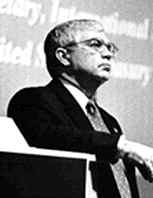 costs for Emerging Markets issuers, commenting “this is at odds with empirical evidence and with comments we have received from many Buy-Side participants.” He expressed skepticism at concerns that new clauses would not allow for aggregation of debt across different instruments, but reasoned that this was outweighed by the greater benefits of predictability. Likewise he disagreed with assertions that by only, at least initially, applying to new bonds, the impact would have relatively little impact, chiding participants for not having begun work on revising clauses in 1996 when a G-10 working group first proposed the idea.
costs for Emerging Markets issuers, commenting “this is at odds with empirical evidence and with comments we have received from many Buy-Side participants.” He expressed skepticism at concerns that new clauses would not allow for aggregation of debt across different instruments, but reasoned that this was outweighed by the greater benefits of predictability. Likewise he disagreed with assertions that by only, at least initially, applying to new bonds, the impact would have relatively little impact, chiding participants for not having begun work on revising clauses in 1996 when a G-10 working group first proposed the idea.
Rogue creditors were not even mentioned in one of his previous speeches, stressed Taylor, as he dismissed comments that the CAC solution was focused on a “not so bad” rogue creditor issue. Finally, Taylor stressed that the US Treasury would also attempt to address other sources of financial crises, in response to allegations that the CAC approach was not too focused on one specific issue while exchange rate pegs, insufficient banking supervision and indexed domestic debt remain potential financial crisis catalysts.
Further Analysis of SDRM Should Not Preclude Implementation of CACs
In the remainder of his keynote presentation, Taylor addressed market skepticism on the IMF’s Sovereign Debt Restructuring Mechanism (SDRM) proposal, a second approach to resolving international financial crises. He acknowledged EMTA’s strong criticism of the SDRM proposal in its position paper, and responded that “good public policy requires carefully investigating all alternatives and pursuing the option or combination of options that will work best.” Taylor affirmed that US policy would continue to pursue both the CAC and SDRM tracks to resolving financial crises, while conceding that implementation of the SDRM raises many issues such as legislative approval, the procedure for appointing a panel or court, and to whom such a body would be accountable.
Taylor concluded by affirming that the CAC approach offers an “effective approach to reforming the Emerging Markets sovereign debt restructuring process.” However, while recognizing the “strong reservations” expressed about the SDRM, the US Treasury would continue to research the possibility of a centralized approach to resolving sovereign defaults. Furthermore, Taylor reaffirmed that the two paths were not mutually exclusive, and ended his remarks by stating that ongoing analysis of the SDRM should not preclude implementation of the decentralized bond clause approach.
(Less than three months following Mr. Taylor’s presentation, Mexico surprised the markets by becoming the first Emerging Markets sovereign to include CACs in its bond documentation. The US Treasury issued a statement praising the decision.)
EMTA Executive Director Speaks Out Against SDRM
EMTA’s Michael Chamberlin also delivered prepared remarks to the crowd. Like Taylor, 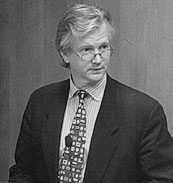 Chamberlin focused much of his remarks on the recent debate in international finance. However, the EMTA Executive Director opined that, “Unfortunately, the focus on restructuring bonds has distracted attention from the larger picture of how best to meet the financing needs of developing economies.”
Chamberlin focused much of his remarks on the recent debate in international finance. However, the EMTA Executive Director opined that, “Unfortunately, the focus on restructuring bonds has distracted attention from the larger picture of how best to meet the financing needs of developing economies.”
Chamberlin reiterated EMTA’s opposition to the SDRM proposal, calling it “a bad idea that will drive investors away from the Emerging Markets and drive up borrowing costs for debtor countries.” On the other hand, he indicated that properly constructed CACs could potentially be useful, and pointed out that EMTA was involved in drafting model clauses that would be made available in the weeks following the Annual Meeting.
Speaking on EMTA’s future contributions to the industry, Chamberlin pledged that EMTA will “work harder, and in closer collaboration with other private sector groups, to engage policymakers in a constructive dialogue of how best to catalyze stable flows of private sector capital into the Emerging Markets in support of sound economic programs and long-term development.”
Despite Concerns, Investor Panel Sees New Money Entering EMs in 2003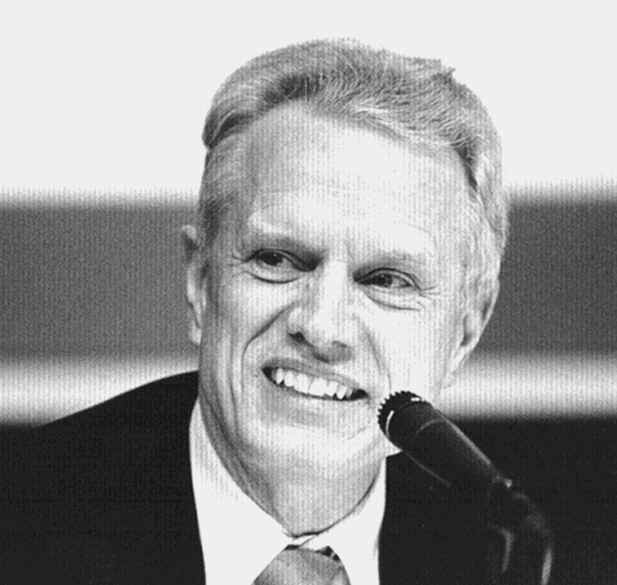 EMTA’s Investor Panel commenced with moderator Tom Trebat (Salomon Smith Barney) polling Buy-Side experts for their predictions on the global economic environment in 2003. First to speak, Hari Hariharan (NWI Investment Management) listed a sizable number of factors an investor should consider in 2003, and evaluated their effects on EM debt performance. Among the factors that could benefit EM investments, according to Hariharan, were the positive long-term effects of a potential increase in liquidity in the US, European and Japanese economies.
EMTA’s Investor Panel commenced with moderator Tom Trebat (Salomon Smith Barney) polling Buy-Side experts for their predictions on the global economic environment in 2003. First to speak, Hari Hariharan (NWI Investment Management) listed a sizable number of factors an investor should consider in 2003, and evaluated their effects on EM debt performance. Among the factors that could benefit EM investments, according to Hariharan, were the positive long-term effects of a potential increase in liquidity in the US, European and Japanese economies.
On the other hand, Hariharan remained concerned by the need for a new approach by the official sector vis-à-vis Brazil, declaring that if some new approach isn’t taken,  “I don’t see anything short of an involuntary restructuring of the domestic debt with all its consequences.” Other items troubling Hariharan included low spreads on some Asian and Eastern European country debt (which he declared “pathetically absurd” and “a bubble”), and an industry benchmark still heavily weighted towards two countries (Mexico and Russia) whose performance is linked to the same commodity (oil). Despite all these concerns, Hariharan later commented, “you have to be deaf; I think next year is going to be a phenomenal market to make money.”
“I don’t see anything short of an involuntary restructuring of the domestic debt with all its consequences.” Other items troubling Hariharan included low spreads on some Asian and Eastern European country debt (which he declared “pathetically absurd” and “a bubble”), and an industry benchmark still heavily weighted towards two countries (Mexico and Russia) whose performance is linked to the same commodity (oil). Despite all these concerns, Hariharan later commented, “you have to be deaf; I think next year is going to be a phenomenal market to make money.”
Remarks by other panelists were more firmly optimistic in nature, with Morgan Stanley Investment Management’s Abigail McKenna stating, “Strangely, or ironically enough, we may just be in a situation where we’re coming off of three years of negative equity returns and that might reflect a huge positive for our markets because you have plan sponsors out there who are scratching their heads, desperately trying to justify eight or nine percent returns.” McKenna further predicted that managers who had written off EM debt in the past, or who made only small allocations, might start giving more dedicated mandates to the asset class.
Jim Barrineau of Alliance Capital concurred, adding that, “What I see, judging from the guys who run different asset classes in our firm, is that there is actually room to increase allocations to Emerging Markets, in many cases substantially.” Barrineau remarked that past performance of EM debt compared to returns in equities has made selling the asset class easier.
 Investors Criticize Official Sector Proposal on Financial Architecture as Harmful and Unnecessary
Investors Criticize Official Sector Proposal on Financial Architecture as Harmful and Unnecessary
Investor panelists condemned the current official sector proposal to create a Sovereign Debt Restructuring Mechanism (SDRM). McKenna, who opined that there remains a “tremendous” amount of confusion in the marketplace as to what US Treasury policy actually is, commented that investors continue to wonder why the official sector is “focusing so much on these issues of collective action clauses and creating a sovereign bankruptcy mechanism when, by anyone’s analysis, these aren’t the biggest problems plaguing our market, nor do any of us believe that they’re going to prevent future crises, mitigate them or slow them down.” McKenna declared, “I can’t think of a worse policy” in attempting to encourage capital flows to the emerging countries, with potential investors discouraged by the knowledge that current international financial policy is subject to change with repercussions on one’s portfolio.
There remain significant questions as to the need for any change in policy, observed Mark Siegel of Babson Mass Mutual, and discussions with official sector representatives 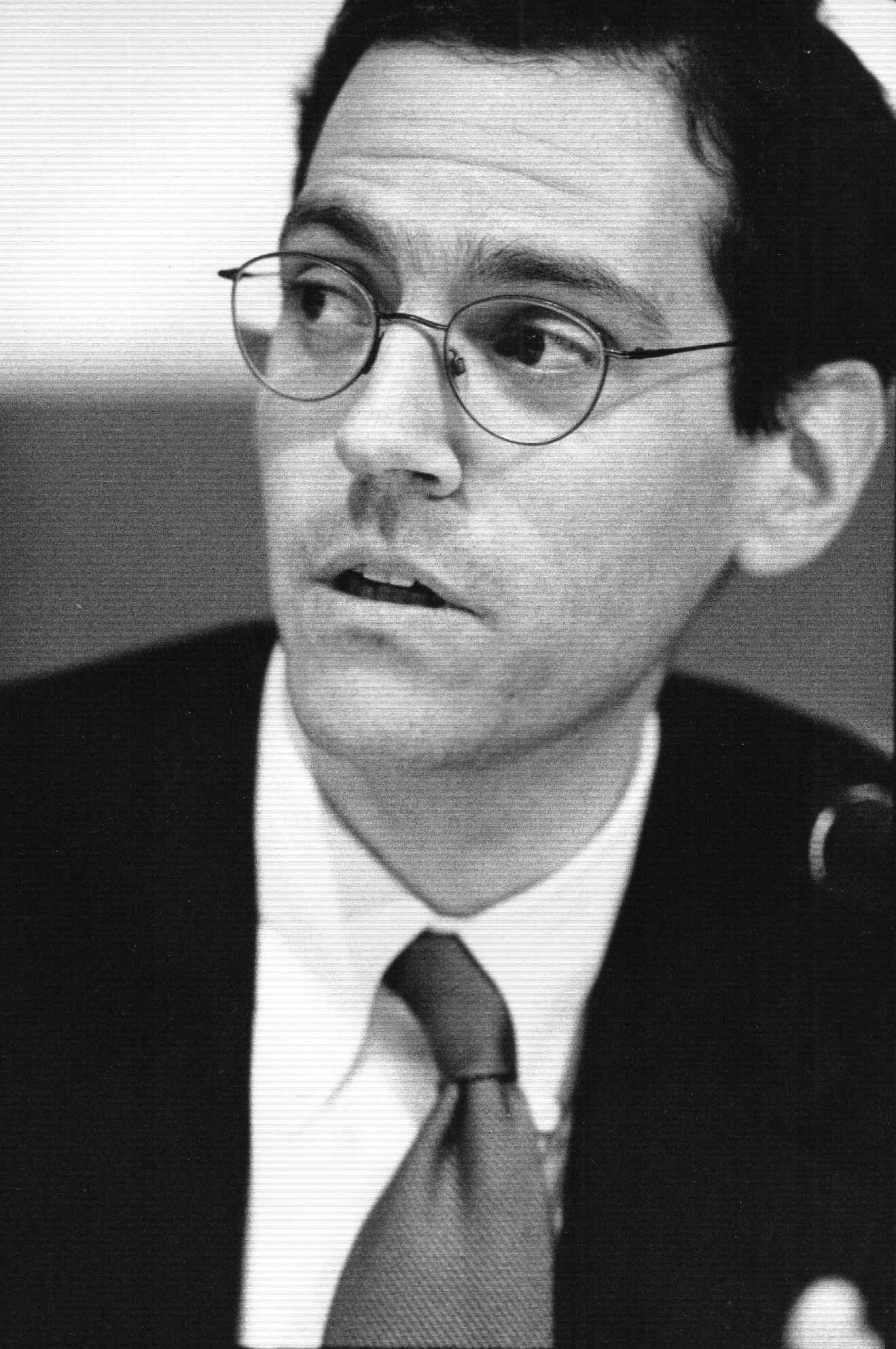 “always really gets back to questions that at some level they hate, which is: tell me again what the problem is that you’re solving, and then we can explore whether or not these architectural shifts are appropriate.” He echoed McKenna’s recommendation that investors would be wise to stay on top of the discussions, and express their objections to the policymakers, as implementation of current proposals could cause great harm to investors.
“always really gets back to questions that at some level they hate, which is: tell me again what the problem is that you’re solving, and then we can explore whether or not these architectural shifts are appropriate.” He echoed McKenna’s recommendation that investors would be wise to stay on top of the discussions, and express their objections to the policymakers, as implementation of current proposals could cause great harm to investors.
Barrineau pronounced the SDRM proposal as “symptomatic of the lack of imagination at the Treasury and IMF in dealing with these problems.” He reiterated a call previously made at EMTA’s Fall Forum for the US Treasury to instead rethink agricultural subsidies and steel tariffs, a plea seconded by Hariharan.
The official sector has prioritized the SDRM while ignoring larger issues, such as Brazil, lamented Hariharan. He sarcastically suggested that Brazilian officials should announce “the discovery of some sleeper cells” in order to gain the attention of preoccupied US officials.
Criticism of the SDRM was later repeated by most of the panelists of the Sell-Side panel that followed the investor discussion.
Argentina and Official Sector Criticized in Handling of Post-Default
Trebat solicited comments on prepared remarks provided by Dave Rolley of Loomis Sayles, who was prevented from speaking at the meeting by the closing of New York’s LaGuardia Airport. Rolley posited that last year’s Argentine default actually helped the EM debt asset class.
McKenna largely agreed, but took the opportunity to strongly rebuke Argentine authorities, as well as the official sector, for their posture toward creditors. McKenna categorized Argentina as yet another sovereign defaulter, “going into hiding, not speaking to its creditors, playing a lot of games…” while speaking only to its least sophisticated retail investors (in order to be able to claim it is entering into a dialogue with creditors). The official sector is more cooperative and cognizant now than previously, according to McKenna; however, “at the end of the day, they really don’t care what private bondholders think,” and the private sector should not expect Argentina to have its “feet held to the fire” by G-7 officials and to be forced to enter into negotiations with creditors as part of IMF loan talks.
Panel Disagrees on Russia, Effects of US Equity Market Recovery on EMs, and 2003 EM Debt Returns
Panelist opinion was divided on a number of topics. Siegel expressed misgivings about less sophisticated investors who are indiscriminately buying Russian assets. “It still astonishes me that there are people who have spent only a day and a half there in the last four years but who tell you about the balance of payments and how it’s incredibly robust and will remain that way, even though they can’t tell you the particulars about the balance of payments,” Siegel declared, adding “Then they go buy a third-tier oil company which may or may not exist…” In contrast, Barrineau asserted that, while acknowledging the “lack of transparency” in Russia, “it does look like a freight train on the way to investment grade…unless oil prices collapse.”
The panel also offered a variety of opinions on how a potential improvement in the US equity market would affect the EM debt market. Barrineau believed a pickup in US stocks  would be “absolutely good.” Siegel and McKenna were more qualified in their responses, with McKenna forecasting that EM debt would benefit in the short-term, but that over the longer term, fund managers would allocate away from debt in favor of equity. Hariharan objected to the question’s assumption that the correlation would be between US growth and US equities, predicting that Brazil would become an issue for equity markets in G-7 countries.
would be “absolutely good.” Siegel and McKenna were more qualified in their responses, with McKenna forecasting that EM debt would benefit in the short-term, but that over the longer term, fund managers would allocate away from debt in favor of equity. Hariharan objected to the question’s assumption that the correlation would be between US growth and US equities, predicting that Brazil would become an issue for equity markets in G-7 countries.
Also controversial on the panel was the strong issuance of EM debt in the weeks preceding the Annual Meeting. Hariharan expressed bewilderment at the recent “pummeling” of the market with new paper and further articulated, “at this point in time, any new paper in the marketplace is just an embarrassment.” Barrineau, on the other hand, responded, “We don’t view the recent spate of issuance as anything other than a normal taking of opportunity” by countries, which had been prevented from tapping the capital markets for much of the year because of global market conditions.
As for potential returns on the EM debt asset class, Barrineau stood out as the most optimistic, boldly forecasting a 17% return. Siegel offered 9% as a prediction, while estimates by McKenna and Hariharan were more conservative, with Hariharan speculating that returns would be flat to up 3% for 2003.
Sell-Side Panel Stresses Importance of ’Confidence Boost’ in Brazil, Mexican Performance Difficult to Repeat in 2003
Jose Luis Daza (Deutsche Bank) once again served as moderator for EMTA’s Sell-Side panel, and divided up the Emerging Markets universe for commentary by fellow panelists. Daza set the discussion in motion by polling 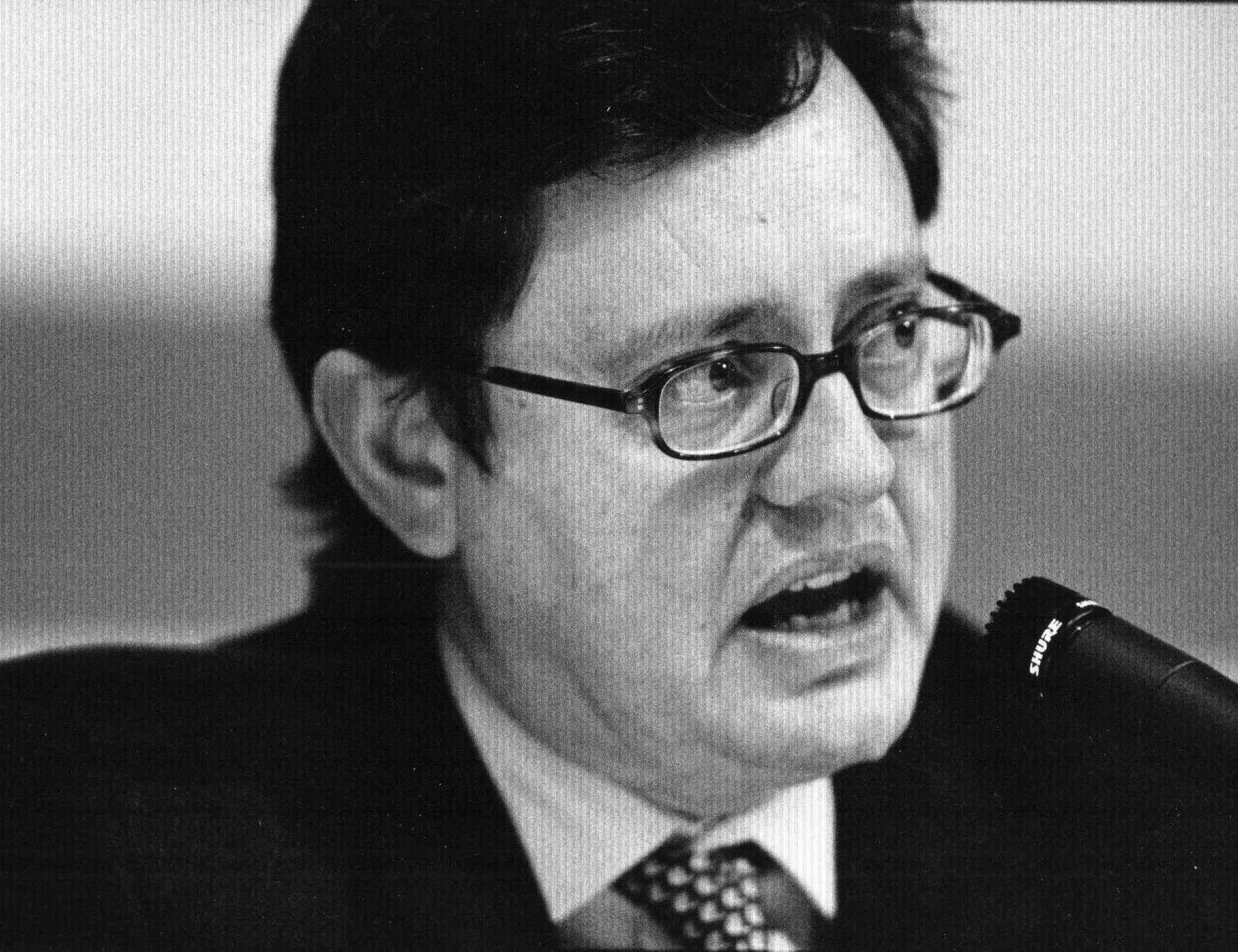 Sell-Side speakers for their thoughts on Brazil’s prospects under newly elected President Lula. Several panelists prescribed a confidence shock as necessary to get the Brazilian economy back on track. Paulo Leme (Goldman Sachs) stressed that the “announcement of an economic team…cannot be [just] good; it has to be extraordinary.” In addition, Leme underscored the importance of a harmonious economic team, opining that the focus on the replacement for the widely lauded Central Bank President Fraga was misplaced. “You can bring in the best cello player…but you have to have good harmony, a good conductor and a good purpose for the music to be good,” he affirmed. Daza quickly declared himself to be in complete agreement. ABN Amro’s Arturo Porzecanski surmised that “the only good thing that can come from all the agony of recent months is that by now it is patently clear to the incoming team in Brazil that, unless they get the markets to like them, their administration is going to have very short legs.”
Sell-Side speakers for their thoughts on Brazil’s prospects under newly elected President Lula. Several panelists prescribed a confidence shock as necessary to get the Brazilian economy back on track. Paulo Leme (Goldman Sachs) stressed that the “announcement of an economic team…cannot be [just] good; it has to be extraordinary.” In addition, Leme underscored the importance of a harmonious economic team, opining that the focus on the replacement for the widely lauded Central Bank President Fraga was misplaced. “You can bring in the best cello player…but you have to have good harmony, a good conductor and a good purpose for the music to be good,” he affirmed. Daza quickly declared himself to be in complete agreement. ABN Amro’s Arturo Porzecanski surmised that “the only good thing that can come from all the agony of recent months is that by now it is patently clear to the incoming team in Brazil that, unless they get the markets to like them, their administration is going to have very short legs.”
Taking the lead on Mexico, Joyce Chang (J.P. Morgan) predicted that Mexico’s performance in 2002 would be difficult to repeat, but called Mexico “attractive” when compared to fellow investment grade sovereigns in Eastern Europe and Asia. However, the lack of progress in the electricity sector has disappointed many in the marketplace, observed Chang, and looked even less likely to take place in the run-up to mid-term elections.
Colombia Has Credit Upgrade Potential... Ecuador Least Financially Secure Andean Country
Daza invited Tulio Vera (Merrill Lynch) to evaluate the prospects of the Andean nations. Vera expressed his belief  that a default was unlikely for any of the Andeans, but that Ecuador was the only possible candidate, commenting that “they will have to do further fiscal adjustment in a political environment that is traditionally fractured.” Vera refused to rule out the possibility of the Ecuadorian dollarization regime being altered in the future, speculating that, if yield from the country’s new oil pipeline was lower than expected, it could potentially set off a balance of payments crisis.
that a default was unlikely for any of the Andeans, but that Ecuador was the only possible candidate, commenting that “they will have to do further fiscal adjustment in a political environment that is traditionally fractured.” Vera refused to rule out the possibility of the Ecuadorian dollarization regime being altered in the future, speculating that, if yield from the country’s new oil pipeline was lower than expected, it could potentially set off a balance of payments crisis.
As for Colombia, Vera conceded that the country has recently demonstrated “some ingredients of a ‘moral hazard’ play,” with the recent visit of US Secretary of State Powell, potential increased bilateral aid and increasing accommodation by the international financial institutions; on the other hand, he posited, reforms and a local bid should help support Colombian debt in the longer term. “Colombia represents probably the only country in Latin America that has the potential for a ratings improvement next year,” concluded Vera.
Argentine Officials Have Missed Reform Opportunities
Porzecanski pointed out that the good news in Argentina in 2002 was the avoidance of  the hyperinflation seen in the 1989 crisis, and that some semblance of confidence is keeping unfrozen funds in the local banking system. Unfortunately, Porzecanski lamented, “this crisis has not been turned into an opportunity to reform the economy, the institutions and the political setup. A set of band-aids have been applied, and good luck to the next administration; that’s basically the policy.”
the hyperinflation seen in the 1989 crisis, and that some semblance of confidence is keeping unfrozen funds in the local banking system. Unfortunately, Porzecanski lamented, “this crisis has not been turned into an opportunity to reform the economy, the institutions and the political setup. A set of band-aids have been applied, and good luck to the next administration; that’s basically the policy.”
Prodded by Daza to comment on Uruguay’s prognosis, Porzecanski remarked that, despite the fact that the country’s economic future remained largely tied to Argentina, it would restructure external debt only if Brazil did so, as the small amount of Uruguay’s Eurobond debt was not a major problem, even for the small country. (He noted, however, that “elegant refinancing” of dollar-denominated local debt was already occurring.)
Strong New Government, Geopolitics Help Turkey; Russian Dependence on Commodities ‘Excessive'
Daza requested that Porzecanski explain the large spread differential between Turkey and Brazil, observing that, despite Turkey’s higher debt burden, higher real interest rates and a larger fiscal deficit, Turkish bonds traded with much tighter spreads than their Brazilian counterparts. Porzecanski attributed this to a number of factors: the strong mandate for the new Turkish government with its pro-Western orientation, Turkey’s falling debt to GDP ratios (in contrast to an increasing ratio in Brazil), the EU “umbrella,” geopolitics and Turkey’s loyal local and external, bid, (in contrast to “a fast-footed investor base that has been having Brazil exposure up to its gills.”)
“I don’t think that Russia is on its way to investment grade in the next three years,” asserted Porzecanski. He alleged that Mexico and Russia have benefited from fear over Brazil more than from their own inherent strengths, and cited Russia’s “excessive dependence” on commodities, which he noted was increasing, while the manufacturing and service industries remain static. Finally, Porzecanski declared that the political situation is more fragile than meets the eye, and criticized the slow pace of the reform process.
 Greater Differentiation Between Credits Translates into Reduced Contagion
Greater Differentiation Between Credits Translates into Reduced Contagion
In addition to country analysis, the panel also touched on a number of general trends in Emerging Markets debt. Chang revealed that a J.P. Morgan analysis of the standard deviation between country spreads indicated that the market is now more “healthy” because a greater differentiation on the part of investors vis-à-vis EM credits translates into a “much reduced” risk of contagion. “Investors are more selective and they are dodging the crisis better,” commented Chang, adding “a lot of traditional financial markets contagion will not be repeated.”
Ms. Chang foresaw inflows of money still coming into the asset class but suggested that, because many of the new mandates are high-grade mandates, new investors are not taking advantage of the universe of EM debt vehicles. Many investors still don’t buy local markets instruments, Chang pointed out, and, according to another internal study, only 29% of 180 investors surveyed use credit default swaps (although 60% of the investors surveyed planned to use them in the future).
Panel Debates Role of US in Latin American Economies
Porzecanski lamented that Latin America, in contrast to the states of Central and Eastern Europe, doesn’t “have a rabbi, doesn’t have a godfather” which would take countries under its wing and promote institutional reform, trade openness, etc. Porzecanski called for the US administration to “open trade,” and to “come up with a new deal for Latin America.”
Playing devil’s advocate, Daza responded by asking why the US should be blamed for “problems that are evidently self-created.” Daza offered South Korea as a model of a country that had found its own solutions to overcome a financial crisis. Leme concurred that most Latin economic problems are “locally induced or produced,” while recognizing the importance of trade policy. Leme declared that reforming US trade policy would not be charity but would benefit the US consumer with access to cheaper agricultural goods. Chang summarized “that bringing the focus back to trade and some of the issues that Mexico had begun talking about with the US before September 11th is what would be most helpful right now.”
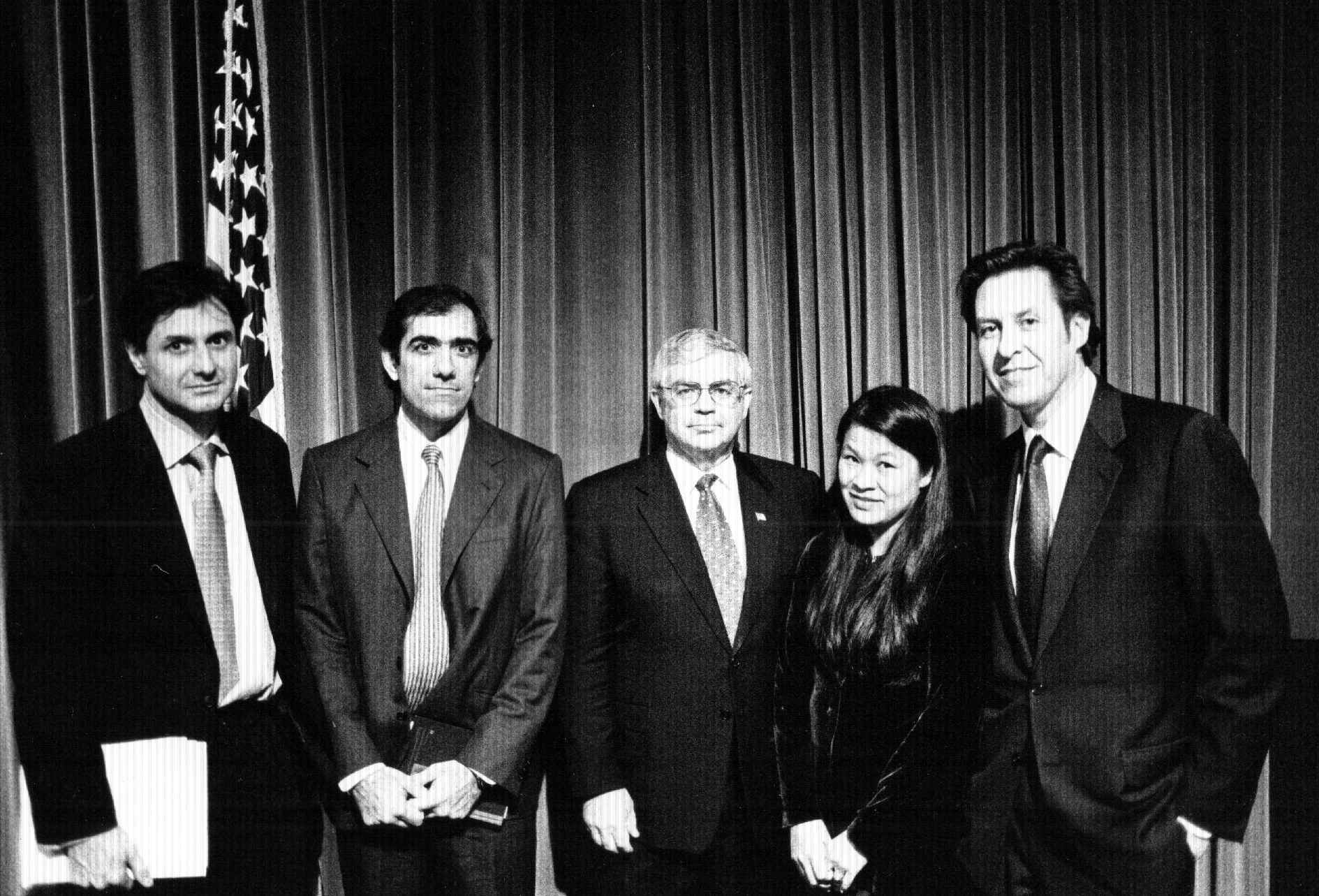
Transcript of Remarks by US Treasury Under Secretary for International Affairs John Taylor.
Transcript of the Buy-Side Panel.
Transcript of the Sell-Side Panel.
Transcript of Remarks by Michael M. Chamberlin, EMTA Executive Director.